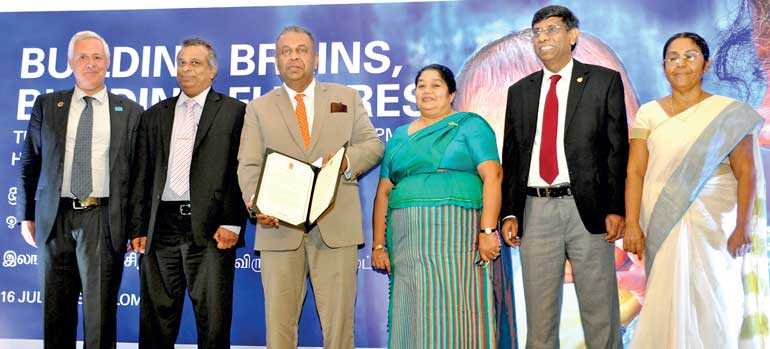Thursday Feb 26, 2026
Thursday Feb 26, 2026
Tuesday, 17 July 2018 00:00 - - {{hitsCtrl.values.hits}}


By Shannon Jayawardena
Several Government ministries together with UNICEF joined hands to present three Budget proposals focused on Early Childhood Development (ECD) to Minister of Finance and Mass Media Mangala Samaraweera yesterday.
Samaraweera said: “I was delighted to accept some of these proposals by the secretaries and I would like to assure you that after studying them, we will be including many of them in the Budget speech which will be presented in November.”
One very important areas of focus is the question of Early Childhood Development and it is salient to Sri Lanka as it has the potential to improve school learning outcomes, which can have long-lasting effects on the wellbeing of the population, the Minister emphasised.
The proposals, marking the Policymakers’ Day of National Early Childhood Care Week 2018, included one for nurturing care, one for a national alternative care program and one for high quality pre-school education and were presented by the Ministries of Health, Nutrition and Indigenous Medicine and Women and Child Affairs Education.
University of Oxford Human Development Professor Edward Melhuish noted: “Twenty per cent of the population do not achieve basic minimum skills and the problem is twice as great for the disadvantaged groups. They have greater risk for poor health, social, emotional and behavioural problems and attention and cognitive problems.”
To support the nurturing care practices of parents, which will improve health, nutrition and responsive care for their children, the Ministry of Health urged the Government to invest in a new baby care manual with instructions on ECD for all new parents to be given at the time of the birth of a child.
It is estimated that nearly 200,000 children under five in the country have some form of a special needs condition. These children are often overlooked by mainstream programs and services designed to ensure child development, excluding them from the specific support required to meet their rights and needs.
Thereby the Ministry also urged the Government to invest in a standardised ECCD educational package with a tool kit for parent education, provided for approximately 6,500 public health midwives to use, digital modules on ECCD assessment of children for public health midwives to use and a nation-wide social marketing campaign that encompasses components of nurturing care.
The Ministry believes that given the current health service coverage and the health service seeking behaviours of mothers in Sri Lanka, the intervention will reach many individuals and result in a combination of positive development outcomes for children in health, nutrition, education, inter-personal relationships and earnings in later life.
The national alternative care program with the aim of reducing the number of children in children’s homes from an estimated 15,000 to 3,500 over the next five years included an assessment of children in children’s homes to determine the reasons.
The proposal also insists that the Government should implement special social and child protection mechanisms that encourage parents and close relatives to accept these children back into a family environment and develop a strategic framework for the National De-institutionalisation program, which will then be piloted in two provinces.
As a result, at least 50% if the children aged 0-5 will benefit, re-uniting with families, receiving alternative care options, and living an environment that will provide nurturing care and a family-like environment in each of the selected provinces.
UNICEF Regional Director for South Asia Jean Gough said: “This is the age to invest as it is the age when their brain develops and forms. This is a testament that we must invest in early years and is key for Sri Lanka to achieve its Sustainable Development Goals.”
She stressed on the fact that developing children care was extremely simple as they only required love, play and food.
Sri Lanka is faced with another major challenge with many children under the age of five not attending pre-school and with the lack of quality education. In 2016 a mere 55.6% three- to five-year-olds attended pre-school. Further, age disaggregation shows that 22.6% of three-year-olds and 63.4% of four-year-olds attended school.
In specific recognition of the importance of high quality, accessible and affordable pre-school education as one of the most salient and cost-effective public investments for children’s lifelong well-being and success, the Ministry of Education urged the Government to introduce a legal framework, policies and action plans for regulations and governance of pre-schools education in Sri Lanka.
They further asked the Government to introduce and implement a national curriculum framework for pre-school education, provide more training and coaching to pre-school teachers while looking at ways to improve their working conditions and recognising them as professionals who play a critical role in children’s early lives and launch a national public awareness campaign on the importance of the early years.
Ministry of National Policies and Economic Affairs Secretary K.D.S. Ruwanchandra stated: “Strong intervention of the state is needed to ensure that children grow in a safe, respected, peaceful and cultural environment and investing in early childhood in turn enhances health and education of children, having long-term benefits.”
Pix by Lasantha Kumara